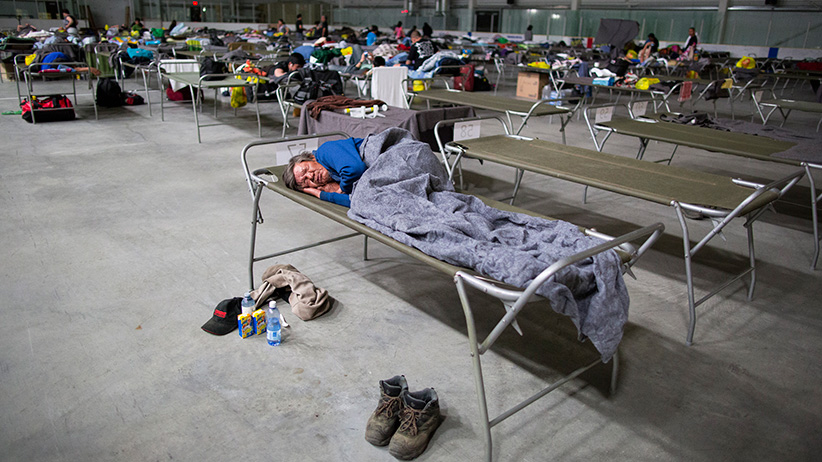How is the Red Cross helping the victims of Fort McMurray?
From food and water to comfort and care, how the Red Cross is responding to the massive wildfire ravaging the Alberta city
Residents of Fort McMurray get some rest in on cots at the Bold Centre in Lac La Biche, AB after being evacuated from fires that have taken over northern Alberta on Wednesday, May 04, 2016 . (Photograph by Chris Bolin)
Share

On Thursday, Prime Minister Justin Trudeau announced that Ottawa would match all individual donations to the Red Cross to assist people fleeing the wildfires around Fort McMurray. Maclean’s spoke with Jean-Philippe Tizi, vice-president of emergency management at the Canadian Red Cross, to find out exactly what sorts of supplies and help the organization provides in the wake of a disaster like this.
Q: What sorts of supplies does the Red Cross bring in that people need immediately in a disaster like this?
A: You see 80,000 people on the move, and many of them have had to leave almost immediately with very little time to prep. Many of them are living with nothing when they arrive at shelter sites.
We need to make sure they have access to food, to water, that they can settle somewhere and be comfortable. So we provide cots and blankets, hygiene kits, all those basic emergency needs.
Beyond that, there is the comfort and care. Many of them are obviously in distress. They’re not sure for how long they’ll be away from home, so there is also this psycho-social support we are providing to people who are in high distress mode.
We help the authorities to set up shelter sites and make sure people are comfortable and they have access to the basics. That’s what we’re doing in Edmonton, and also in Lac la Biche now. We have requests in Calgary now as well, and we try to respond to those needs, mobilizing our staff and volunteers now from across the country.
What we already know is that the recovery effort will be long. Many people will have lost not only their homes but also their jobs. So we will be there to help those people to recover, to return to a normal life, and that could take different forms of assistance: cash assistance, supports for reconstruction, health and psycho-social supports, resuming small businesses.
When you’re talking about psycho-social support, what form does that take?
We have Red Cross volunteers trained in that. It’s not mental health, it’s really safety and wellbeing. Many people just need to talk through what they have been through. They need help in how to navigate the systems, how to get access to the basics. It’s really about having people on the ground helping them.
In an evacuation like this, what special needs of children does the Red Cross try to help with?
Children and families, there’s obviously special attention to them. Very often, what we deployed in those shelter sites is recreational activities for children—making sure they are busy, they have enough space to play, that they are going through those moments with a bit of fun, really.
If there is a shortage of shelter spaces for people who have been evacuated, what can the Red Cross do to help?
We need to work with the authorities to find sites that can accommodate people for a few days or a few weeks. There are sites, it’s just a matter of organizing that: It could be schools, gymnasiums—what we call congruent shelter. If it’s longer, it’s looking at commercial lodging and transitional lodging solutions.
How do you physically transport relief supplies where they’re needed?
We’re prepared for those situations. We have cots and blankets and hygiene kits pre-positioned across the province. It’s about mobilizing them by road, mainly, to the sites. And if we have not enough in Alberta, then we mobilize the stuff we have pre-positioned across Canada.
What is the most difficult point after a disaster or evacuation, or the hardest thing to accommodate?
We are here for the long run, whether there is media attention or not. We already know that it’s going to take a few years to rebuild. We’ll be there. We have a few difficulties ahead of us in terms of coordination, logistics, helping people navigate through the system, insurance. It’s always a bit complicated, but that’s what we do.
We have seen after the Alberta floods and Saskatchewan fires, the return to normal, it takes time. It’s really not [the case that] because you’re back to your community that suddenly it’s all fine. So it’s making sure that we’re all well equipped to support them in the long run because those people are going through a rough, rough time.